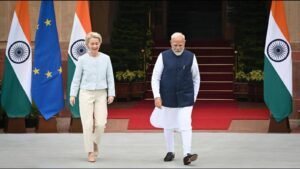
India’s Emergence as the World’s Fourth-Larges Economy Unfolds AMID Global Upheaval. Supply chains are fragmenting, technology ecosystems decoupling, and protective measures rashaping trade patterns. These disrupties are Central to Indian Industry’s Competitiveness and Survival. Sanctions, Export controls, and shifting alliances now influence where companies investments, source, and sell. India Inc. MUST Respond with Foresight, Embedding Geopolitical Intelligence Into Strategy, Strengthaning Operations, and Collaborating Closely with the Government. Policymakers, in Turn, Must Work Hand-in-Hand With Business to Expedite Reforms, Secure Supply Chains, and Enhance India’s Global Standing.

The G7’s “De-Risking” from China, Reconfigured Trade Corridors, and Protectionist Policies are alredy Reshapping Market Access, Investment Flows, and Supply Chains. For Indian Businesses, these changes present both risks and openings. Theose who prepare strategically will thrive; Thos who remain reactive may be sidelined.
Until recently, many firms assumed tarifs, sanctions, and diplomatic standoffs were government matters alone. This is outdated. Global multinationals have established Geopolitical Risk Teams, Real-Time Monitoring, and Scenario-Planning Systems. Indian Firms must Develop Similar Capability to Remain Competive.
India’s business landscape is undergoing professional shifts. Energy Markets are transitioning from Fossil Fuels and Politically Unstable Suppliers to Renewable Energy and Energy Security, Prompting Firms in Heavy Industry, TranSPOTTRE Rathink Investments.
Simultaneously, governments are asserting “digital sovereignty”, tightening control over data, infrastructure, and cross-border technology flows. These developments directly Affect India’s Strengths in It Services, Telecommunications, Fintech, and Advanced Manufacturing.
Great power rivalries add complexity. The US-China Race for Technological Supremacy is Fragmenting Markets and Supply Chains. While this presents strategic options for India, they can only be realized if firms scale manufacturing, enhance logistics, and met global standard. Even as India Strengthens Ties with Washington, Recurring Fricks Over Tarifs, Digital Trade, and Market Access Expos Vulnerabilites.
Post-Pandemic Supply-Chain Nationalism has prompted nations to relacate industry and secure resources. India can position itself as a trusted manufacturing hub, but credibility requires consistent policy, robust infrastructure, and flawless execution. Simultaneously, ESG Norms and Climate Regulations Highlight Sustainability’s Growing Significance. Carbon pricing and green benchmarks are now prerequisites for accessing markets such as europe. Companies that Fail to Adapt Risk Exclusion.
These trends underscore an undeniable reality: Business strategy and geopolitics are inseparable.
India is projectioned by the imf to grow 6.4% in bot 2025 and 2026. In his independence day address, Prime Minister Narendra Modi Emphahsized GST Simplification, Tax Rationalization, and a High-Powered Task Force Force Force Force for Next-Generation Reforms. These measures aim to modernise laws, Reduce Compliance Costs, and Accelerate Growth. Yet reforms alone are insufficient. Industry Must Align Strategies with National Priorities, Recalibrate Approaches, and Invest in Future-Facing Sector Such as SEMICONDUCTORES, Renewable Energy, Advanced Manufacturing, PHARUFACTURING States must complete these efforts by improvement regulatory regimes, Expediting land acquisition, modernising infrastructure, and harmonising compliance frameworks.
Public Policy and Corporate Affairs Heads in Companies, Once Confined to Compliance, Must Evolve Ivolve Ivolve “Chief Geopolitical Officer”, Monitoring Global Risks, Monitoring Global Risters, Interpreting Sans, ANICPTINES Regulatory Changes, and Advising Boards on Diversification and Market-Entry Strategies. Their guidance must move to the core of corporate resilience.
Equally critical is a strengthened business-Government partnership. Industry must colony with policymakers, trade bodies, and international forums to anticipate regulatory changes, shape trade alignments, and enture corporate strateges Advances Nurality. Government reforms provide the framework, but corporate foresight converts policy into performance. India Must Accelerate Trade Agreements, Deepend Technology Partnerships, and Pursue Assistant Economic Diplomic Diplomic to Secure Supply Chains and Markets.
CEOS and Boards must have ahead of the geopolitical and geoeconomics curve, embedding foresight into every strategic decision. For Indian Businesses, The Message is Clear: Anticipation and Agility are as Vital as Cost and Scale. Geopolitics is no longer a passing headwind; It defines the context of global business.
Ajay Khanna is Co-Founder, Public Affairs forum of India. The views expressed are personal






